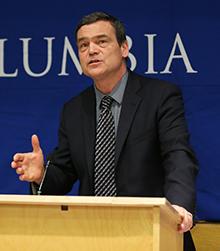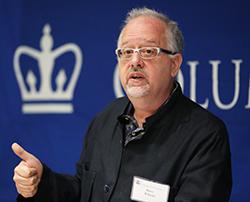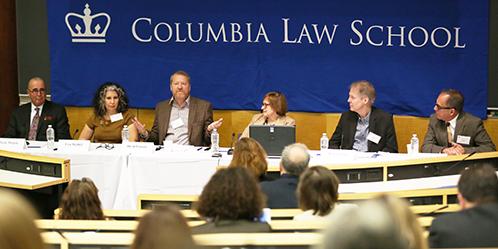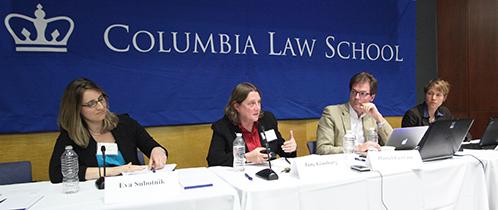Creation Is Not Its Own Reward
Artists, Performers, and Intellectual Property Attorneys Gather at Columbia Law School to Discuss Copyright Protections in Daylong Symposium Sponsored by Kernochan Center for Law, Media, and the Arts
New York, October 20, 2014—Pulitzer Prize winners T.J. Stiles and Doug Wright stressed the importance—and limitations—of the copyright regime in protecting their work and livelihood in keynote speeches that kicked off an Oct. 10 symposium sponsored by Columbia Law School’s Kernochan Center for Law, Media, and the Arts.
| Pulitzer Prize-winning biographer T.J. Stiles talks about copyright and his career. |
The daylong event, “Creation Is Not Its Own Reward: Making Copyright Work for Authors and Performers,” featured panel discussions and audience Q&A sessions with creators—including writers, actors, songwriters, photographers, and graphic artists—and intellectual property attorneys. Kernochan Center Executive Director June M. Besek made introductory remarks to start the symposium, introducing Stiles, Wright, and the variety of participants speaking throughout the day.
“In the copyright policy debates, often the loudest voices are those of large copyright owners and even more so those of copyright users including ISPs [Internet service providers] such as Google,” Besek said. “That’s why we’re excited to present this symposium focused on individual creators and, in particular, on professional creators. They will be able to give us insight into whether copyright is working for them and the challenges of making a living in the digital environment.”
Stiles, who took home the Pulitzer in 2010 for his biography The First Tycoon: The Epic Life of Cornelius Vanderbilt, discussed the difficulties writers face working in an age in which readers feel they are entitled to free or below-cost content on the Internet. Without copyright, Stiles said, he would have no chance at making a career as a writer.
“I am not owed a living by the world—I may screw up, I may get unlucky, I may simply fail—and no human institution is perfect, but the copyright regime gives me hope of building my career and accumulating income streams that make this kind of work viable,” Stiles said.
| Pulitzer Prize-winning playwright Doug Wright explains how the copyright regime helps sustain theater. |
Stiles’ fellow keynote speaker Wright, who won the Pulitzer in 2004 for his play I Am My Own Wife, discussed the importance of copyright for playwrights. He explained that in the early days of the Dramatists Guilds of America, playwrights gave up their right to unionize in order to preserve control over their work through copyright. Hollywood writers, by contrast, do not own their work but do enjoy the benefits afforded to them through the collective bargaining process, such as health care.
Wright, who has had four works produced on Broadway, said copyright law is why playwrights who have found success in Hollywood keep coming back to plays.
“One reason for theater’s survival is that dramatists so value copyright that they continue to write for the humble stage,” he said. “For playwrights like me, copyright doesn’t provide incentives—it is the incentive."
After the keynote addresses, the symposium featured the following panel discussions:
"Authors’ Perspectives: Part I” moderated by Besek with:
• Rick Carnes, songwriter; president, Songwriters Guild of America
• Eugene Mopsik, executive director, American Society of Media Photographers
• David Hajdu, author; associate professor, Columbia Journalism School
• David Lowery, musician; lecturer, University of Georgia Terry College of Business
• Lisa Shaftel, graphic artist; advocacy liaison, Graphic Artists Guild
• Eugene Mopsik, executive director, American Society of Media Photographers
• David Hajdu, author; associate professor, Columbia Journalism School
• David Lowery, musician; lecturer, University of Georgia Terry College of Business
• Lisa Shaftel, graphic artist; advocacy liaison, Graphic Artists Guild
| Panelists left to right: Gene Mopsik, Lisa Shaftel, David Lowery, June Besek, Rick Carnes, David Hajdu |
“Authors’ Perspectives: Part II” moderated by Philippa Loengard, assistant director of the Kernochan Center, with:
• Richard Masur, actor; former president, Screen Actors Guild
• Eddie Schwartz, president, Songwriters Association of Canada
• Sandra Aistars, chief executive officer, Copyright Alliance
“Industry Perspectives,” moderated by Kernochan Center Fellow Bart M.J. Szewczyk, with:
• Joseph Gratz, partner, Durie Tangri
• Scott Martin, executive vice president of intellectual property and associate general counsel, Paramount Pictures
• Christian Genetski, general counsel, Entertainment Software Association
• Christian Genetski, general counsel, Entertainment Software Association
• Jay Rosenthal, senior vice president and general counsel, National Music Publishers Association
“Academic Perspectives,” moderated by Columbia Law School Professor and Kernochan Center Faculty Director Jane C. Ginsburg, with:
• Eva Subotnik, professor, St. John’s University School of Law
• Molly Van Houweling, professor, UC Berkeley School of Law; co-director, Berkeley Center for Law & Technology
• Molly Van Houweling, professor, UC Berkeley School of Law; co-director, Berkeley Center for Law & Technology
• Daniel Gervais, professor, Vanderbilt Law School; director, Vanderbilt Intellectual Property Program
| Panelists left to right: Eva Subotnik, Jane Ginsburg, Daniel Gervais, Molly Van Houweling |
“Government Perspectives,” moderated by Kernochan Center Fellow Brad A. Greenberg, with:
• Sy Damle, special advisor to the general counsel, U.S. Copyright Office
• Shira Perlmutter, chief policy officer and director for international affairs, U.S. Patent and Trademark Office
• Shira Perlmutter, chief policy officer and director for international affairs, U.S. Patent and Trademark Office
The Kernochan Center for Law, Media, and the Arts was established to contribute to a broader understanding of the legal aspects of creative works of authorship, including their dissemination and use. The center regularly hosts influential intellectual property practitioners on copyright and other issues.
In 2013, the Kernochan Center hosted Maria Pallante, the register of the U.S. Copyright Office, who delivered Columbia Law School’s Horace S. Manges Lecture and called on Congress to revisit the nation’s copyright laws to address creators’ rights and new technologies. As Besek pointed out in her introductory remarks, the House Subcommittee on Courts, Intellectual Property and the Internet may indicate what sort of copyright reforms it will seek as early as next year.
The complete video of the conference will be available on the Kernochan Center’s website soon.



